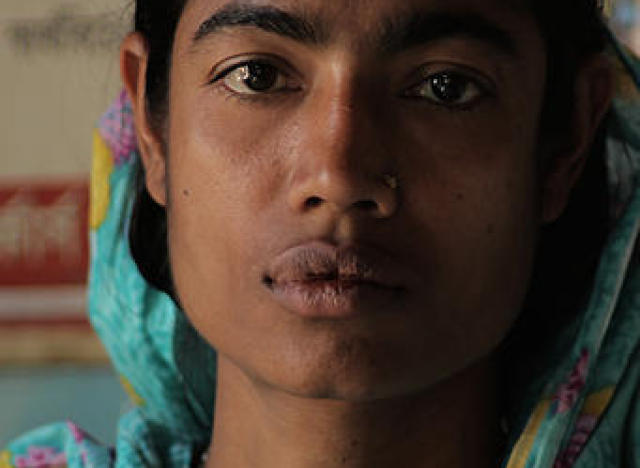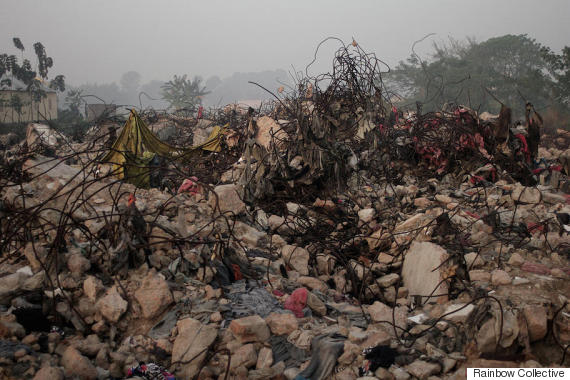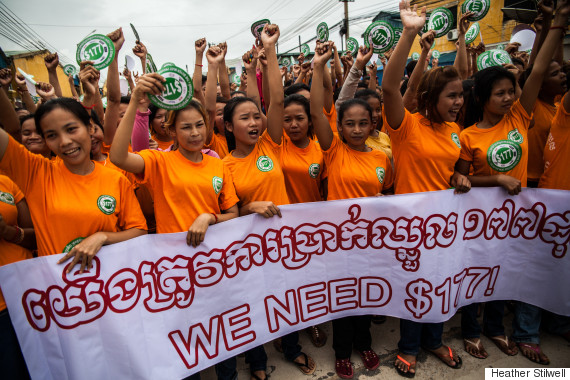With plus-size models becoming the norm and Karl Lagerfeld using feminist placards in Chanel's 2015 Spring show, on the surface, it seems the fashion industry is finally embracing feminism.
But are the women making the clothes we wear feeling the benefit?
According to campaign group Labour Behind The Label, there are approximately 24 million garment workers worldwide. Around 80% of those are women.
"Conditions for the women making our clothes are harsh," Ilana Winterstein, a director at Labour Behind The Label tells HuffPost UK Lifestyle.
"Many face working excessive hours - often 14-16 hours per day - with forced overtime and no job security, for poverty wages and without trade union rights recognised.
"They suffer poor health, are victims of sexual and physical abuse and cannot afford to send their children to school."
Image may be NSFW.
Clik here to view.
A garment worker in Bangladesh
Many UK brands manufacture their products using factories abroad, in countries such as India, Cambodia and Bangladesh.
Winterstein tells us the majority of factories do not have adequate health and safety checks in place. Workers might be using old machines in factories with bars on the windows and locked doors. There are often no fire extinguishers on site.
"This has resulted in deadly factory fires over recent years," she says. "There is systemic exploitation across the industry and the repression of trade unions means that workers are often too fearful to speak out about their reality."
Boramey Hun, an ActionAid policy and campaign manager who is based in Cambodia, agrees that conditions inside garment factories need to be improved.
She explains that workers are usually placed in groups, or teams, within a factory. Each team is given a set amount of items they must produce and targets are alarmingly high.
"If they run to the bathroom, they have to be very quick, otherwise it will affect how much they can produce and they might end up not meeting the quota," she says.
"Workers often end up holding themselves from going to the bathroom. The arrangement makes it very difficult for some workers who are not at the same health level as others and can lead to team breakdown among workers."
As consumers in the UK, it's all too easy to be seduced by the lure of fast fashion.
But Hun points out that our shopping habits contribute to the problems faced by female garment workers.
“Don’t enjoy cheap products. Cheap products involve cheap labour," she says.
"You need to use your power as consumers to question if the brand respects labour law and offers decent wages to workers - keep questioning, challenging and putting pressure on the brand."
If we are truly feminists, we need to stop and think before picking up yet another £5 t-shirt.
Where has that item come from? Who has made it? Is she being treated as an equal?
Perhaps the key is to remember that, in some ways, we are not so different from female garment workers abroad.
Here in the UK, women continue to fight for better understanding on maternity leave and balancing employment with motherhood.
These feminist topics also affect women working in garment factories.
Both Hun and Winterstein say short-term contracts are an issue for these women. Garment workers do not receive any pay for annual leave and will not be paid maternity leave.
In fact, women can expect to have their contract terminated as soon as their boss finds out they are pregnant.
"Hiring practices can include subjecting women to pregnancy tests, and asking them if they are married, or planning to have children," Winterstein adds.
Historical and social inequality is perhaps the reason why so many women are working in such dire conditions.
In countries such as Cambodia, women are typically paid far less than men. Some from the poorest areas must take any work they can get in order to survive.
These women have fewer routes open to them to address injustice than men. The reason for this is simple: a lack of education for girls.
"They do not have the skills to find a better job," Hun says. "Also, with limited knowledge, they often fall for wrong information on jobs and are tricked into exploitation."
So, what's being done to give garment workers a fairer and safer life?
"Some big brands are making progress, however no high street brands are what we would term 'ethical' and much more needs to be done," Winterstein says.
This year, 24 April marks the second anniversary of the Rana Plaza factory collapse in Bangladesh - the deadliest disaster in the history of the global garment industry.
Image may be NSFW.
Clik here to view.![rana plaza]()
Rubble from the Rana Plaza
Official government figures state 1,134 people died as the building housing five garment factories came crashing down.
"Many high street brands were producing at the factories," Winterstein says. "Many families lost their only bread winner and are now struggling to survive, and of the survivors many cannot afford medical bills, and are too injured to work in a factory again in an area with few other employment prospects.
"Others who are able to work are stigmatised as survivors of Rana Plaza, turned away by factory managers who believe they are damaged goods and won't be able to work as hard."
Labour Behind the Labels is currently running a campaign asking Benetton to pay the "$5 million they owe in compensation to the survivors and victims families of the Rana Plaza disaster".
HuffPost UK Lifestyle contacted Benetton for comment on this campaign, but have yet to hear back at the time of publication.
Winterstein believes companies and governments need to establish a living wage in order to truly help garment workers aboard.
"So much rests on this and the links between health, safety and wages are evident," she says.
"It is not enough for brands to state that their suppliers pay a minimum wage, as often this falls well below what is needed to live with dignity. Brands need to engage with local trade unions to ensure that workers voices are heard."
Image may be NSFW.
Clik here to view.![cambodia]()
Garment workers campaigning in Cambodia
Until a living wage is established, consumers here in the UK can help improve conditions for garment workers abroad by putting pressure on companies back here in the UK.
"Boycotting may have to be the final straw," Hun says.
If millions of women are working in horrific conditions, usually under male bosses, to produce clothes that are sold here in the UK, fashion is most definitely a feminist issue.
As feminists, we all have a responsibility to make sure these women are treated with the respect they deserve.
As Winterstein says: "No one should live in poverty for the price of a cheap t-shirt."
But are the women making the clothes we wear feeling the benefit?
According to campaign group Labour Behind The Label, there are approximately 24 million garment workers worldwide. Around 80% of those are women.
"Conditions for the women making our clothes are harsh," Ilana Winterstein, a director at Labour Behind The Label tells HuffPost UK Lifestyle.
"Many face working excessive hours - often 14-16 hours per day - with forced overtime and no job security, for poverty wages and without trade union rights recognised.
"They suffer poor health, are victims of sexual and physical abuse and cannot afford to send their children to school."
Image may be NSFW.
Clik here to view.

Many UK brands manufacture their products using factories abroad, in countries such as India, Cambodia and Bangladesh.
Winterstein tells us the majority of factories do not have adequate health and safety checks in place. Workers might be using old machines in factories with bars on the windows and locked doors. There are often no fire extinguishers on site.
"This has resulted in deadly factory fires over recent years," she says. "There is systemic exploitation across the industry and the repression of trade unions means that workers are often too fearful to speak out about their reality."
Boramey Hun, an ActionAid policy and campaign manager who is based in Cambodia, agrees that conditions inside garment factories need to be improved.
She explains that workers are usually placed in groups, or teams, within a factory. Each team is given a set amount of items they must produce and targets are alarmingly high.
SEE ALSO:
Most Fashion Consumers 'Would Pay More' For Ethical Clothing Production
Can I Be a Feminist and a Fashion-Lover?
"If they run to the bathroom, they have to be very quick, otherwise it will affect how much they can produce and they might end up not meeting the quota," she says.
"Workers often end up holding themselves from going to the bathroom. The arrangement makes it very difficult for some workers who are not at the same health level as others and can lead to team breakdown among workers."
As consumers in the UK, it's all too easy to be seduced by the lure of fast fashion.
But Hun points out that our shopping habits contribute to the problems faced by female garment workers.
“Don’t enjoy cheap products. Cheap products involve cheap labour," she says.
"You need to use your power as consumers to question if the brand respects labour law and offers decent wages to workers - keep questioning, challenging and putting pressure on the brand."
If we are truly feminists, we need to stop and think before picking up yet another £5 t-shirt.
Where has that item come from? Who has made it? Is she being treated as an equal?
Perhaps the key is to remember that, in some ways, we are not so different from female garment workers abroad.
Here in the UK, women continue to fight for better understanding on maternity leave and balancing employment with motherhood.
These feminist topics also affect women working in garment factories.
Both Hun and Winterstein say short-term contracts are an issue for these women. Garment workers do not receive any pay for annual leave and will not be paid maternity leave.
In fact, women can expect to have their contract terminated as soon as their boss finds out they are pregnant.
"Hiring practices can include subjecting women to pregnancy tests, and asking them if they are married, or planning to have children," Winterstein adds.
Historical and social inequality is perhaps the reason why so many women are working in such dire conditions.
In countries such as Cambodia, women are typically paid far less than men. Some from the poorest areas must take any work they can get in order to survive.
These women have fewer routes open to them to address injustice than men. The reason for this is simple: a lack of education for girls.
"They do not have the skills to find a better job," Hun says. "Also, with limited knowledge, they often fall for wrong information on jobs and are tricked into exploitation."
So, what's being done to give garment workers a fairer and safer life?
"Some big brands are making progress, however no high street brands are what we would term 'ethical' and much more needs to be done," Winterstein says.
This year, 24 April marks the second anniversary of the Rana Plaza factory collapse in Bangladesh - the deadliest disaster in the history of the global garment industry.
Image may be NSFW.
Clik here to view.

Official government figures state 1,134 people died as the building housing five garment factories came crashing down.
"Many high street brands were producing at the factories," Winterstein says. "Many families lost their only bread winner and are now struggling to survive, and of the survivors many cannot afford medical bills, and are too injured to work in a factory again in an area with few other employment prospects.
"Others who are able to work are stigmatised as survivors of Rana Plaza, turned away by factory managers who believe they are damaged goods and won't be able to work as hard."
Labour Behind the Labels is currently running a campaign asking Benetton to pay the "$5 million they owe in compensation to the survivors and victims families of the Rana Plaza disaster".
HuffPost UK Lifestyle contacted Benetton for comment on this campaign, but have yet to hear back at the time of publication.
Winterstein believes companies and governments need to establish a living wage in order to truly help garment workers aboard.
"So much rests on this and the links between health, safety and wages are evident," she says.
"It is not enough for brands to state that their suppliers pay a minimum wage, as often this falls well below what is needed to live with dignity. Brands need to engage with local trade unions to ensure that workers voices are heard."
Image may be NSFW.
Clik here to view.

Until a living wage is established, consumers here in the UK can help improve conditions for garment workers abroad by putting pressure on companies back here in the UK.
"Boycotting may have to be the final straw," Hun says.
If millions of women are working in horrific conditions, usually under male bosses, to produce clothes that are sold here in the UK, fashion is most definitely a feminist issue.
As feminists, we all have a responsibility to make sure these women are treated with the respect they deserve.
As Winterstein says: "No one should live in poverty for the price of a cheap t-shirt."